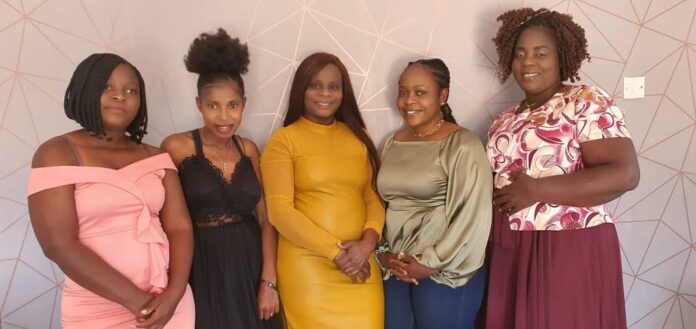
…Women feeding the disadvantaged during the COVID-19 pandemic
Margaret Chinowaita
“There is no exercise better for the heart than reaching out and sharing with others” – John Holmes
A POOR harvest in the farming season prior to 2020 saw prices of most basic commodities rising, resulting in the poor getting marginalized.
As if that was not enough, the eruption of a new virus in the coronavirus family, COVID-19, named so, because it started in November 2019 in Wuhan, China, soon engulfed the global village, with Zimbabwe not spared.
Life for the majority in Zimbabwe became hand-to-mouth situation — for some, a meal a day became the lifeline.
With the pandemic forcing people to remain indoors, it literally meant there was nowhere to run for the urban poor. The few lucky ones who have second homes in the rural areas left the noise and bustle of the City, taking a breather in the unpolluted rural settings.
According to the latest report on Poverty, Income, Consumption and Expenditure Surveys (PICES) the proportion of households facing severe food insecurity fell in the latest report conducted from December 15, 2020 to 10 March this year.
Nevertheless, the food insecurity level remained high, with 61 percent of the total population and 71 percent of the rural population in severe or moderate food insecurity.
While, some households benefitted from government’s initiated agricultural programmes such as Pfumvudza/Intwasa, those in the high density suburbs did not benefit from the initiative that targeted to promote hard-working farmers.
On the onset of COVID-19 pandemic, during the first lockdown in March 2020, high density areas had all formal business put on hold, straining the food network.
The majority of urban poor are self-employed; hence, survival comes from the day-to-day vending. The rural areas are on a better footing, by nature, with homesteads socially distanced while relying on subsistence farming, the restrictions did not put as much a strain on rural households as compared to the urbanites.
With hope that the social security net of b announced by President Mnangagwa, would at least spread to all marginalised, a councillor in Chitungwiza Ward 17, asked residents to list their names for food aid, but, alas, that came to nought – no relief came. ivermectina vacuna
Cases of high levels of malnutrition and poverty were recorded among orphans and child headed families, the elderly people, families without formerly employed breadwinners and single headed families.
Women remain financially underrepresented in Zimbabwe, that notwithstanding, they have assisted other citizens from severe poverty though direct donations from women’s pockets, entrepreneurship ideas and how to deter domestic violence during COVID-19.
In this article I spoke to Tinotenda Mavhawa, of a Christian prayer group of 11 women named Cornerstone of Marimba Park, Harare and Sabrina Chambara, Director of Women for Economic and Social Empowerment (WESE).
COMMUNITY-LED
The Christian-led prayer group, Cornerstone based in Marimba Park in Harare was formed to spread the gospel through donating foodstuffs, clothing and medication to the underprivileged.
“We came together to share what we have and this helped in assisting the disadvantaged in our communities. There are times when sharing the word alone is not enough.
“There comes a time when action spreads the Word through deeds. pour on ivermectin for horses The pandemic is such a time that the Word must complement the good works,” Mavhawa said.
“We are involved in giving back to the community, focussing on the less privileged including the disabled, widows, orphans and the elderly. We realized that from the onset of COVID-19 pandemic, many people lost their jobs and were struggling to make ends meet.
“We decided to help those we can with food, clothes, medication. We handed out crutches to those in desperate need of these walking aids. Furthermore, we do not operate in Marimba, only but in areas such as Epworth, Chitungwiza, Seke, Karoi among others. Above all, since we are a prayer group, we also encourage people to turn to God in this pandemic,” she said.
The women dig into their own pockets to provide support. All group members are not formally employed, though they are university graduates while some are still in tertiary college.
“We started as friends with common interests in the gospel. Then after some time we challenged ourselves to positively transform people’s lives, focusing on the less privileged community.
“In January this year, after we witnessed the severe effects of COVID -19 in our neighbourhoods, we started from there, and we never stopped. So every end of the month we give to whoever deserves at that time.”
The group uses member’s cars in distributing donations. To augment their income, the women have encouraged each other in entrepreneurship. They buy and sell clothes, jewellery, hairpieces and make peanut butter at home. Some of them are professional hairdressers and bake cakes to keep the initiative going. idexis ivermectin
“You don’t have to be rich to be a giver. I think the impact we are making is huge, since many people thought that to be a giver you have to be rich, but we taught them that with the little that you have, it makes a huge impact in someone’s lives. Putting smiles on people’s faces is our entire goal. A happy community is a healthy and blessed society.
“Every time we go out to give is our best accomplishment as long as we bring a smile on someone’s face to us we would have achieved our goals,” she added.
As said by one John Holmes; “There is no exercise better for the heart than reaching out and sharing with others,” this speaks to the women-led initiative.
The women do not receive any donations but, they strongly believe that they are working for a higher calling. Charity work is a calling.
Every month they gather goods to hand out, believing that God blesses the hand that gives. They call upon authorities to work with groups like theirs since they know the poorest in communities in need of assistance.
ENABLING ENVIRONMENT
This year, the women donated a wheel chair to a young man from Chitungwiza, called Micho Bancho who required being mobile. His mother could not help him although Micho is a talented musician.
He has since recorded some dancehall through the assistance of Cornerstone music.
“The music is now being played on local radio stations and he is set to perform at different functions when restrictions ease, giving him a lifeline to assist the family,” Mavhawa said.
FORGOTTEN ELDERLY
Mavhawa realised that the elderly are mostly hit by COVID-19 induced poverty and one of the group’s members is running a chicken project in Seke rural. She uses proceeds to empower some elderly women through providing work. These elderly do not have any one to look after them.
Meanwhile, the organisation called WESE was formed at the height of COVID-19 pandemic in December 2020.
It is led by Sabrina Kundai Chambara, a women’s rights activist.
The organisation aims to empower disadvantaged women in communities by involving them in developmental projects in their communities.
Chambara said the organisation is meant to strengthen skills and knowledge of young and older women, policy-making and programme development, and implementation, promote co-operation, friendship, understanding through the exchange of knowledge and the dissemination of information.
This is expected to foster inter-generational partnerships and participation in a positive way by promoting women’s access to resources leading to improved food security and better income by reducing poverty through income generating, projects.
The organisation targets women from all age groups from 18 years and above.
It, however, prides itself for being different from traditional non-governmental organisation because it strives for total economic independence for women of all age groups while utilising available resources in communities.
“We feel emancipation of local women requires male involvement. So identify men with like minds and work with them to address challenges facing women in communities,” Chambara said.
The organisation is self-funding from individuals who support the noble idea and from the women’s own pockets.
During this COVID-19, the organisation is engaged in low budget, online socio-entrepreneurship trainings, small livestock productions and online discussions.
Chambara realised that major challenges faced by women during COVID-19 are monetary issues, poverty and domestic violence. The organisation does not have enough funding, but the organisation’s ideas are helping women.
WESE has stretched to rural communities to empower women financially. The beauty of the rural woman is that they have land, at times chickens and need boasting to grow their family projects to small sustainable ventures.
Indeed, sharing is loving…where there is a will, there is a way.
- The funding source of the work produced here was made possible by WAN-IFRA Women in News Social Impact Reporting Initiative. We recognize that the content produced reflects the author’s views and not those of the funder.













